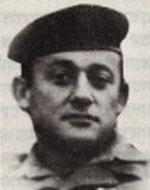Shmuel (Mula), son of Mina and Shaul Haramati, was born on September 5, 1930, in Sobelki, Poland. He immigrated to Israel with his parents, and in 1936 moved to Be’er Tuvia. At an early age, Molla had an independent lifestyle. He used to come back from school, take care of his younger brother, bake bread, and other housework. After a short time he began to work in agricultural work and did not abandon this work until the end of his life. In the evening he would go out with his peers in the moshav, and at night he would sit down and record in his diary experiences and impressions from all that he had been through during the day. After graduating from elementary school, Stefandia was accepted to the Haifa Naval School. Although he excelled in his studies, the village and agriculture attracted him more, and when he returned home to finish high school, he devoted himself energetically to all the activities he had abstained from during his studies at the naval school. He returned to head the various activities of the company, organized classes, evenings of singing and dancing, plays and performances. At that time, the village secretariat agreed to give the Haramati family an agricultural farm, and there was a large part in obtaining the approval for that. With his usual diligence, he became involved in the task of establishing the economy, turning the land into a good one, building the cowshed and cultivating the other branches. From morning to night he worked in plowing, sowing, spawning and irrigation, and in the evening, after his day’s work, he took a quick shower and went out for social activities. During the same period, Arab attacks on the surrounding communities intensified and the security activity in the village began to expand. The activities of the community began to take place, such as filling sandbags, setting up barbed wire fences and guarding the village. In May 1947 Molla was called to enlist. During the War of Independence, he participated in the battles of Beit Darras, Negba, Marar and Kis Falluja and was one of the pioneers of the Nitzanim children under the noses of the Egyptians. He completed his regular service as a corporal. After the Yom Kippur War ended, Mula was released and returned to the village and began to organize youth in the Moshavim movement. He devoted his time and energy to the establishment of the team, which would deal with the guidance of the youth. The counselors’ seminar, which was one of its organizers, served as an important link in the chain of activities, and many of the moshavim went out to help guide them in immigrant moshavim and in the outposts. After a long period of activity in the fields of organization and training, he wanted to return to Be’er Tuvia and establish his own farm. He married a woman and began to build his home and farm in the village, and later his eldest son was born When the Yom Kippur War broke out, Molla was immediately called to his unit. When he reached the area of the conference, he was given urgent organizational names, for he was known for his organizational ability. When the brigade reached the battlefield on the Sinai front, it was immediately put into battle. The battalion he headed was ordered to attack the Firdan Bridge and at the end of the battle, only seven tanks survived. On the evening of that day, Molla gathered the men who had remained in the battle, clarified the situation of the forces, explained to them how the battle would take place the next day. He encouraged the fighters and gave them courage and a spirit of battle. The next day he led the force with a scan and careful progress toward the Firdan bridge. He controlled the movement of his forces, and despite the fact that he was not a tank man and was the first time to command a tank battalion, he led the force wisely and efficiently and brought him back safely. On the “Mars” axis towards the Suez Canal, encountered an enemy force and conducted a long battle with it, and was ordered to move south towards the hills from which they attacked the Firdan Bridge two days earlier. Egypt was moving toward the hills. Because of the conditions on the ground, Mullah’s tanks could not side with their nests and reach a firing position, and when he saw it he jumped out of his armored personnel carrier and his machine-gun barrel on the sides of the tanks, urging his men to move forward the Egyptians. The Egyptians suddenly turned their backs and began to flee, as the advance of the tanks forward effectively broke the Egyptians’ attack on his courageous behavior during the battle, including advancing the tanks, And on the face-to-face battle with the Egyptian squad, Molla was awarded the “Medal of Honor” On October 11, 1973, when he boarded his armored personnel carrier to look at the enemy, a shell hit the armored personnel carrier and Molla fell, he was brought to eternal rest in the Beer Tuvia cemetery, his family published a book in memory of Molla’s life story, the story of the battle that he fell in and the words of friends and family about him and his life’s work, as well as stories in his memory and his character in books, articles, newspapers and various journals.
